情态动词的复习与练习(辽宁省大连市甘井子区)
图片预览
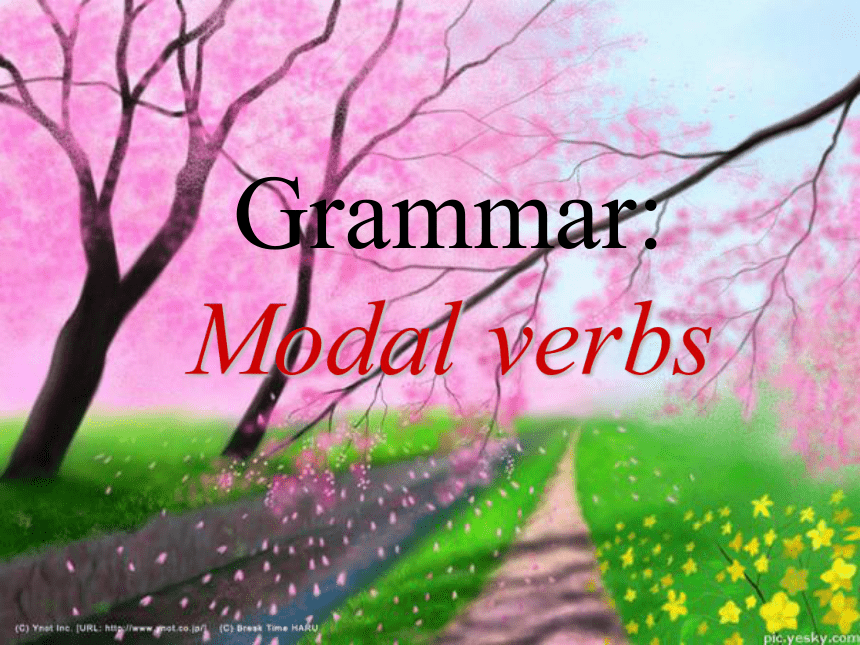

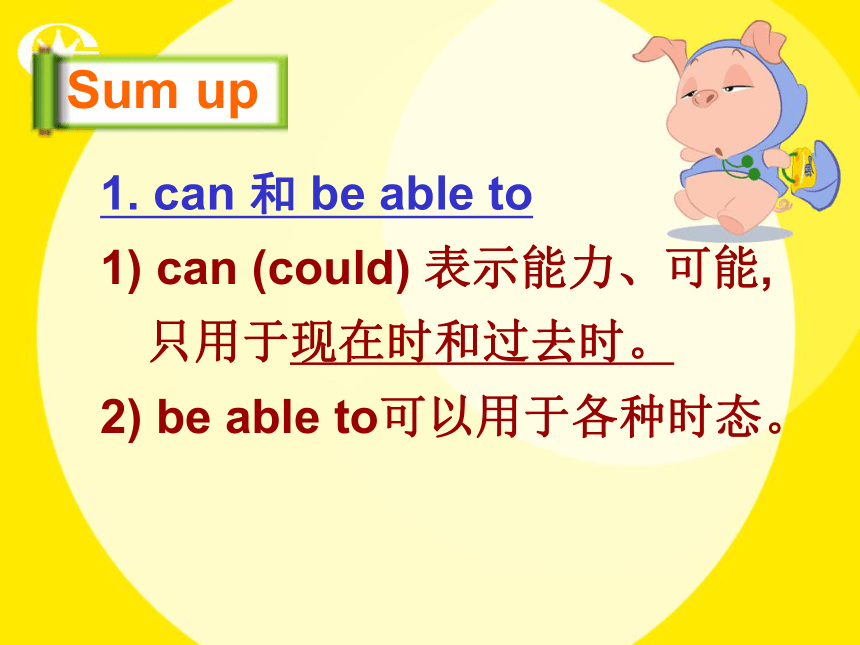
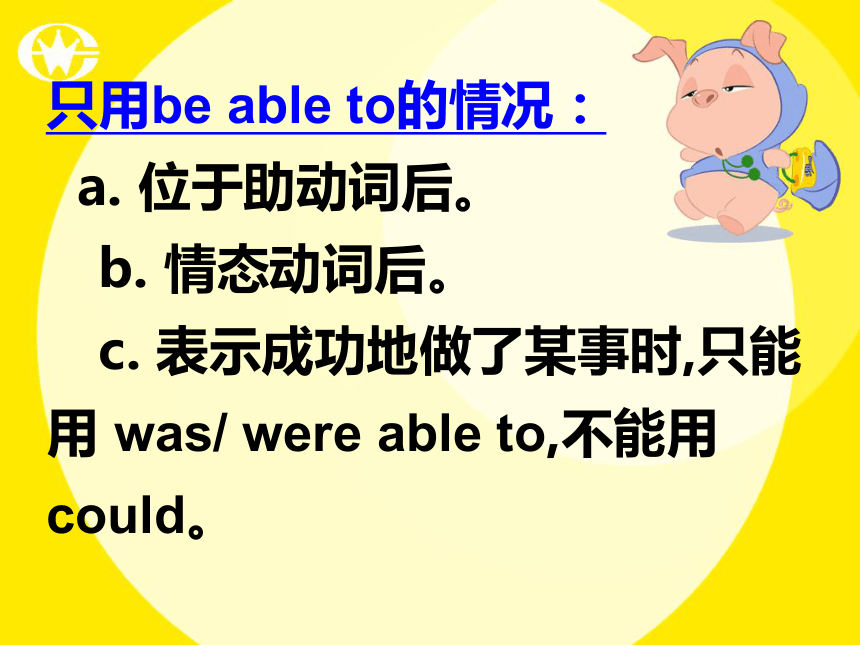
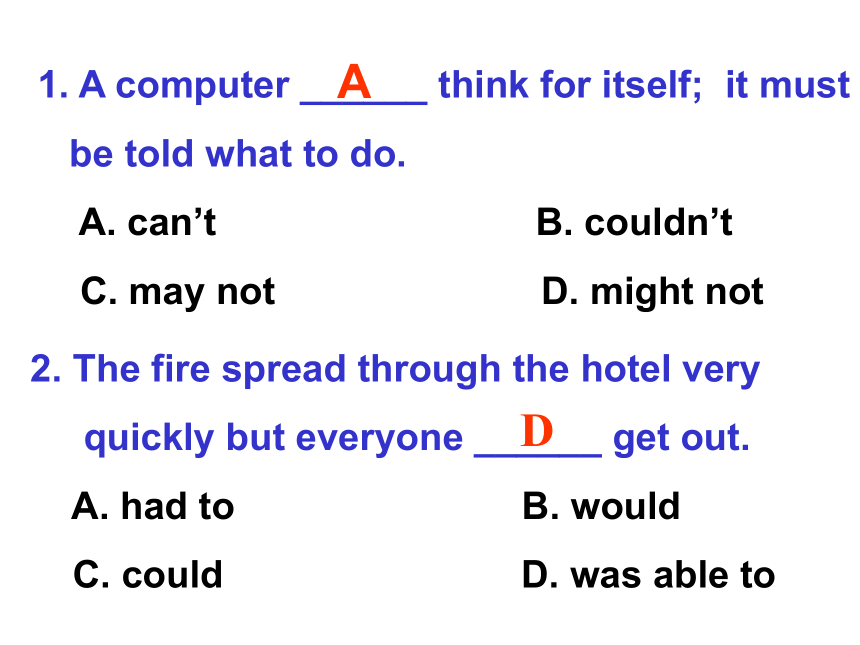
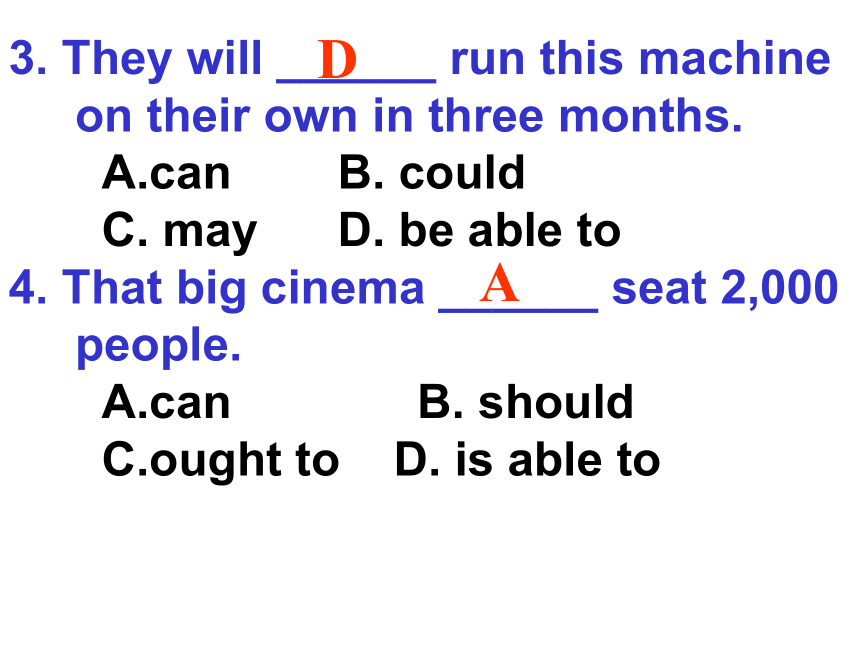
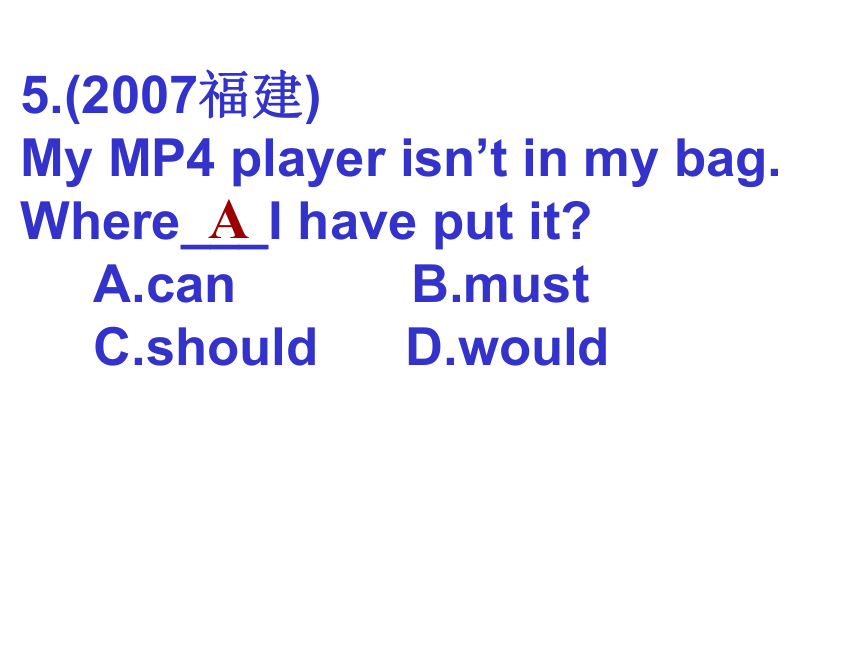

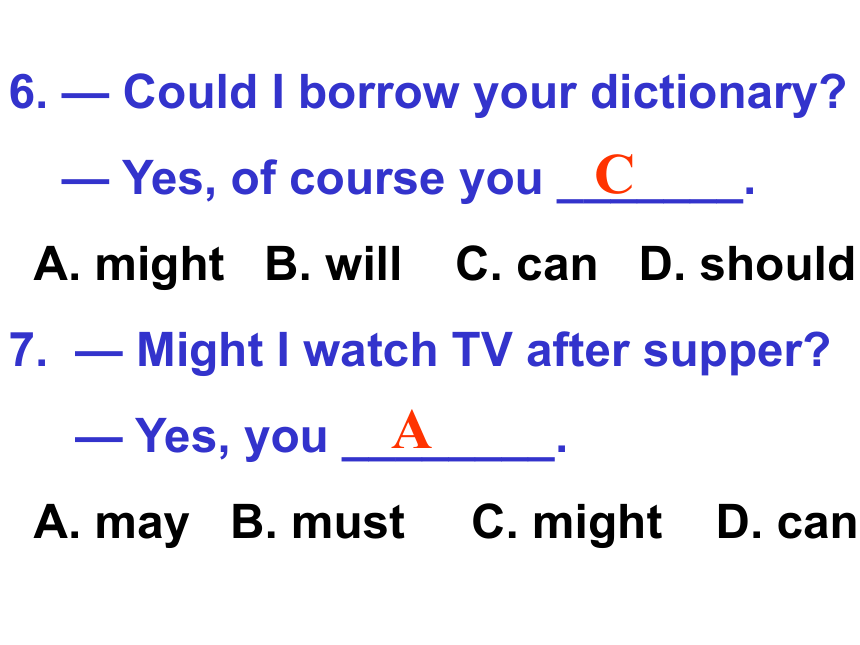
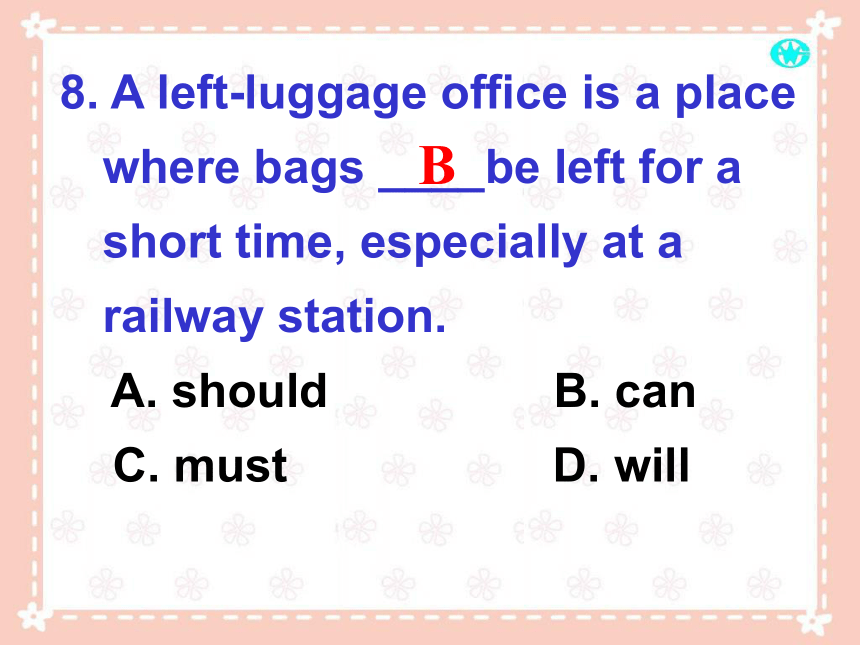
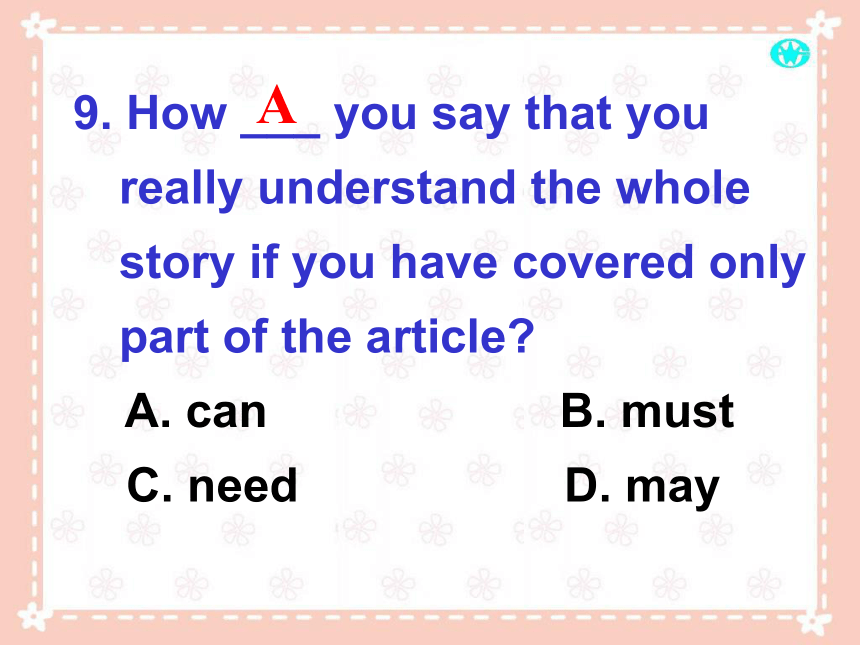
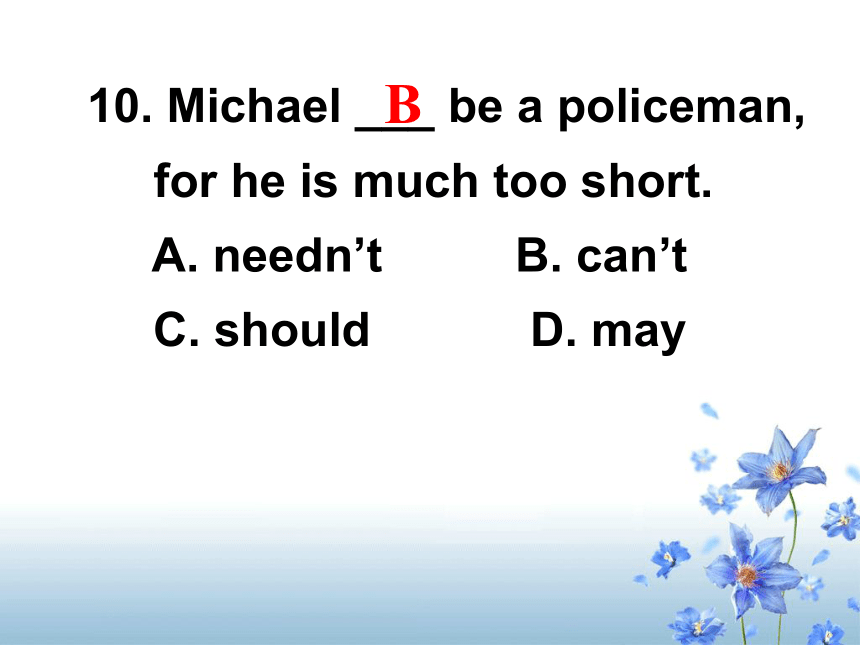
文档简介
课件93张PPT。Grammar: Modal verbs情态动词有一定的意义
无人称和数的变化
通常不带to
表示说话人的语气或情绪语法特征Sum up1. can 和 be able to
1) can (could) 表示能力、可能, 只用于现在时和过去时。
2) be able to可以用于各种时态。只用be able to的情况:
a. 位于助动词后。
b. 情态动词后。
c. 表示成功地做了某事时,只能用 was/ were able to,不能用could。1. A computer ______ think for itself; it must
be told what to do.
A. can’t B. couldn’t
C. may not D. might not2. The fire spread through the hotel very
quickly but everyone ______ get out.
A. had to B. would
C. could D. was able toA D 3. They will ______ run this machine
on their own in three months.
A.can B. could
C. may D. be able to
4. That big cinema ______ seat 2,000
people.
A.can B. should
C.ought to D. is able toD A 5.(2007福建)
My MP4 player isn’t in my bag.
Where___I have put it?
A.can B.must
C.should D.wouldA注意:could不表示时态,只表示
1) 提出委婉的请求,回答中不可用could。
--- Could I have the television on?
--- Yes, you can. / No, you can’t.
2) 在否定、疑问句中表示推测或怀疑。
He couldn’t be a bad man. 6. — Could I borrow your dictionary?
— Yes, of course you _______.
A. might B. will C. can D. should
7. — Might I watch TV after supper?
— Yes, you ________.
A. may B. must C. might D. can
C A 8. A left-luggage office is a place where bags ____be left for a short time, especially at a railway station.
A. should B. can
C. must D. willB9. How ___ you say that you really understand the whole story if you have covered only part of the article?
A. can B. must
C. need D. mayA10. Michael ___ be a policeman, for he is much too short.
A. needn’t B. can’t
C. should D. may
B11.Mr. Bush is on time for everything. How ___it be that he was late for the opening ceremony?
A. can B. should
C. may D. mustA12. — I heard they went skiing in the mountains last winter.
— It ____ true because there was little snow there.
A. may not be B. won’t be
C. couldn’t be D. mustn’t beC 13.The World Wide Web is sometimes jokingly called the World Wide Wait because it _____ be very slow.
A. should B. must
C. will D. can
NMET 2005 浙江 9 DNMET 2006 四川 3214---Is Jack on duty today? ---It??? be him. It’s his turn tomorrow.
A. mustn’t? B. won’t ?
C. can’t? D. needn’t C2. may和might
1) 表示允许或请求;表示没有把握的推测;may 放在句首,表示祝愿。
e.g. May God bless you!
He might be at home.
注: might 表示推测时,不表示时态。只是可能性比may 小。2) 成语:may/might as well,后面接不带to 的不定式,意为"不妨"。
e.g. If that is the case, we may as well try.
15. — Is John coming by train?
— He should, but he ____ not.
He likes driving his car.
A. must B. can
C. need D. mayD16. — Are you coming to Jeff’s party?
— I’m not sure. I ___ go to the
concert instead.
A. must B. would
C. should D. might
D3. have to和must
1) 两词都是“必须”的意思, have to 表示客观的需要, must 表示说话人主观上的看法, 即主观上的必要。
My brother was very ill, so I had to
call the doctor in the middle of the
night.
He said that they must work hard. 17.(2007)北京
In crowded places like airports
and railway stations,you _____
take care of your luggage.
A.can B.may C.must D.willC2)have to有人称、数、时态的变化,而must 只有一种形式。但must 可用于间接引语中表示过去的必要或义务。
He had to look after his sister
yesterday.3) 在否定结构中:don’t have to 表示“不必”;mustn’t 表示”禁止”。
You don’t have to tell him about it.
You mustn’t tell him about it. needn’t 没必要 ( = don’t have to )
can’t 不能; 不可能
may not 可能不
shouldn’t 不应该 ( = ought not to )18.(2007重庆)
---What do you think we can do for
our aged parents?
---You_____do anything except to be
with them and be yourself.
A.don’t have to B.oughtn’t to
C.mustn’t to D.can’tA19. You ______ return the book now.
You can keep it till next week if you like.
A. can’t B. mustn’t
C. needn’t D. may not
20. Johnny, you _____play with the knife,
you _____hurt yourself.
A. won’t ; can’t B. mustn’t ; may
C. shouldn’t ; must D. can’t ; shouldn’tC B 21. --Will you stay for lunch?
--Sorry, _____. My brother is
coming to see me.
A. I mustn’t B. I can’t
C. I needn’t D. I won’t
22--May I pick a flower in the garden?
-- ________.
A. No, you needn’t
B. Not, please.
C. No, you mustn’t
D. No, you won’tB C 23.NMET 2005 全国 1 26John, look at the time. ______ you play the piano at such a late hour?
A. Must B. Can
C. May D. NeedA24.NMET 2006 浙江 19--- Could I have a word with you, mum?
--- Oh dear, if you _____.
A. can B. must
C. may D. shouldB4.表示推测的用法
can,could,may,might,must 皆可表
示推测,其用法如下:
1) 情态动词+动词原形,表示对现在将来的情况的推测,此时动词通常为系动词。
I don’t know where she is, she may be in Wuhan.25.(2007)上海
---Guess what!I have got A for my
term paper.
---Great!You ____read widely and
put a lot of work into it.
A.must B.should
C.must have D.should haveC26.(2007)江苏
---She looks very happy.She ____
have passed the exam.
---I guess so.it’s not difficult
after all.
A.should B.could
C.must D.mightC27.(2007)江西
---Where is my dictionary?
I remember I put it here
yesterday.
---You ____it in the wrong place.
A.must put B.should have put
C.might put D.might have putD2) 情态动词+动词现在进行时, 表示对现在或将来正在进行的情况进行推测。
At this moment, our teacher must be correcting our exam papers. 3) 情态动词+动词完成时, 表示对过去情况的推测。
We will have finished this work by the end of next December.
The road is wet. It must have rained last night.
may (might) have + done sth.,
can (could) have + done sth.
表示过去,推测过去时间里可能发生的事情。Philip may (might) have been hurt
seriously in the car accident.
Philip can (could) have been hurt
seriously in the car accident.(2) must have+done sth., 表示对过去时间里可能发生的事情的推测,语气较强,具有“肯定”的意思。
--- Linda has gone to work, but her bicycle is still here.
--- She must have gone by bus.(3) ought to have done sth.should have done sth.本应该做某事,而事实上并没有做; 否定句表示“不该做某事而做了”。You ought to (should) have been
more careful in this experiment.
He ought not to have thrown the old
clothes away.(事实上已扔了。)
注: ought to 在语气上比should 要强。28.(2007)浙江
---My cat’s really fat.
---You _____have given her so
much food.
A.wouldn’t B.couldn’t
C.shouldn’t D.mustn’tC29. Oh, I’m feeling well in the stomach,
I ___ so much fried chicken just now.
A. shouldn’t eat
B. mustn’t have eaten
C. shouldn’t have eaten
D. mustn’t eatC4)情态动词+动词的现在完成进行时,表示对过去正在发生事情的推测。
Your mother must have been looking for you. 5)推测的否定形式,疑问形式用can’t, couldn’t 表示。
Mike can’t have found his car, for he came to work by bus this morning.
注: could, might表示推测时不表示时 态,其推测的程度不如can, may。反意疑问He may be a student,
He may be studying,
He may have left,
He may have left yesterday,isn’t he?
isn’t he?
hasn’t he?
didn’t he?30.NMET 2005 天津 14I _______ have been more than six years old when the accident happened.
A. shouldn’t B. couldn’t
C. mustn’t D. needn’tB31. My English-Chinese dictionary has disappeared. Who ___ have taken it?
A. should B. must
C. could D. would
C32. My sister met him at the Grand Theatre yesterday afternoon, so he ___ your lecture.
A. couldn’t have attended
B. needn’t have attended
C. mustn’t have attended
D. shouldn’t have attendedA① 他们可能在等我们, 赶快点!
② 他们可能在干什么呢?
③ 他不可能在看电视,一定在看书。
④ 你想必把此事忘了。
⑤ 咱们去问问他,他也许看过这部电影。
⑥ 大桥不可能这么快就竣工了。
They may be waiting for us. Let’s hurry!What can they be doing ? (≠ might / may)He can’t be watching TV. He must be reading.You must have forgotten it.He might have seen the film. Let’s ask him. The bridge can’t have been finished so soon.33. I was really anxious about you. You ___ home without a word.
A. mustn’t leave
B. shouldn’t have left
C. couldn’t have left
D. needn’t leave
BNMET 2004 福建 3234---I’ll tell Mary about her new job tomorrow.
---You _______ her last week.
A. ought to tell
B. would have told
C. must tell
D. should have toldD4) needn’t have done sth. 本没必要做某事
I dressed very warmly for the trip,but I needn’t have done so. The weather was hot.
5) would like to have done sth. 本打算做某事
I would like to have read the article, but I was very busy then.5. should和ought to
should 和ought to 都为“应该”的意思,可用于各种人称。
--- Ought he to go?
--- Yes. I think he ought to.
表示要求,命令时,语气由 should(应该)、(had better最好)、must(必须) 渐强。 ought to/should
“非常有可能”It is Saturday afternoon. They ought to/should be back home.35.---When can I come for the photos? I need them tomorrow afternoon.
---They ___ be ready by 12:00.
can B. should
C. might D. need 36. It’s nearly seven o’clock. Jack ___ be here at any moment.
must B. need
C. should D. can37.(2007)全国
---How‘s your tour around the North
Lake? Is it beautiful?
---It_____be,but it is now heavily
polluted?
A.will B.would
C.should D.mustC38.NMET 2001 上海 34You can’t imagine that a well-behaved gentleman ______ be so rude to a lady.
A. might B. need
C.should D. wouldC 39.(2007)辽宁
---Turn off the TV,Jack.____your
homework now?
---Mum,just ten more minutes,
please. A.should you be doing
B.shouldn’t you be doing
C.couldn’t you be doing
D.will you be doingB6. had better 表示“最好”
had better 相当于一个助动词,它只有一种形式,它后面要跟动词原形。
had better (not) do sth.It is pretty cold. You’d better put
on my coat.
She’d better not play with the dog.
had better have done sth.表示与事
实相反的结果,意为“本来最好”。
e.g. You had better have come earlier.
7. would rather 表示“宁愿”
would rather (not) do
would rather…than…宁愿…而不愿
would sooner/had rather/had sooner 表示"宁愿"、"宁可"的意思。
e.g. If I have a choice, I had sooner not continue my studies at this school.8. will和would
1) would like to do = want to 想要
Would you like to go with me?
2) Will you…? / Would you like…?
表示肯定含义的请求劝说时,疑问句中一般用some, 而不是any。
Would you like some cake?will用在主语是第二人称的疑问句中,表示“请求”Would you pass the salt, please?
Will you please pass the salt?will用于主语是各人称的陈述句中,表示“意愿、倾向”
---The phone is ringing.
---I’ll get it.
3) 否定结构中用will, 一般不用would, won’t you是一种委婉语气。
e.g. Won't you sit down?
Won’t---What’s wrong with your pen?
---I don’t know. The ink ____ come out.
A. mustn’t B. can’t
C. won’t D. shouldn’t
The machine won’t start.
The window wouldn’t open.
C used to / would used to表达存在于过去但现在不再存在的一种习惯或情况。Jack used to live in Chicago.Used to表达过去存在的某种情况时,would不能替代它。I used to live in California.
They used to have a Ford. would可以用于表达过去定期重复的一个动作。
表达这个概念时,would 和 used to 相同。When I was a child, my father would / used to read me a story at night before bed.9. need和dare
这两词既可做实义动词用,又可做情态动词用。作为情态动词,两者都只能用于疑问句,否定句和条件句。
need 作实义动词时后面的不定式必须带to,而dare作实义动词用时, 后面的to时常可以被省略。1) 实义动词: need+ n. / to do sth.
2) 情态动词: need,只用原形need后加do,否定形式为need not.
e.g. ---- Need you go yet?
---- Yes, I must. / No, I needn't.
3) need, want, require, worth(形容词)后面接doing也可以表示被动。
need doing = need to be donedare to do
dared to do
didn’t dare(to) do
dare not do
Dare he do…?
I dare say 我想,大概 10.shall
I. 表示“询问”用于一、三人称
Shall I open the door?要我开门吗?
Shall he stay here for the night? 让他留下过夜吗?
II.表示允诺,命令,警告,决心。用于二、三人称
If you /they work well ,you /they shall be well paid
III. 表示“强制”“威吓”等,用于二、三人称
He says he won’t come, but I say he shall.
If you go there again, you shall lose what you’ve got.40.(2007)四川
---What does the sign over there
read?
---”No person___smoke or carry
a lighted cigarette,cigar or
pipe in this area.”
A.will B.may C.shall D.mustCShould 是shall的过去式,它本身的词义为“应当”(=ought to)
Shall的上述三种用法中,I、II两种不可用should,否则句意了。
在III中若用should则语势较弱。
Should在虚拟语气中的用法这里暂不介绍 41. ---The room is so dirty.
____we clean it?
--- Of course.
A. Will B. Shall
C. Would D. DoB42.---___ we go out for a walk?
--- Good idea. What time
shall we meet?
A.Shall B. Let
C. Will D. Must43. It has been announced that candidates __ remain in their seats until all the paper have been collected.
A. can B. will C. may D. shall
44. — I hear you’ve got a set of valuable Australian coins. ___ I have a look?
—Yes, certainly.
A. Do B. May C. Shall D. ShouldDB45. He ______ be punished if he
disobeys.
如果他不服从, 就要受到惩罚.
46. We are not going to quarrel at all
if you ____ only let me speak.
只要你让我说话, 我们根本就不会吵架.
47. --Sir, ____ he go or stay?
--Let him go.
A. will B. shall C. might D. couldshallwillB 48. The door _______ open.
这门经常打不开.
49. Ronald ______ stay in his small
garden for a long time every day
in the past.
A. could B. might C. should D. would
50. You _____ have the book after I
read it.
我看完以后一定把这本书给你.won’tD shall51. Sorry, I’m late. I ___ have turned off the alarm clock and gone back to sleep again.
A. might B. should
C. can D. willA 52. There was a lot of fun at yesterday’s party. You ___ come, but why didn’t you?
A. must have
B. should
C. need have
D. ought to have
D 53. — When can I come for the photos? I need them tomorrow afternoon.
— They ___ be ready by 12:00.
A. can B. should
C. might D. needB54. — I stayed at a hotel while in New York.
— Oh, did you? You __with Barbara.
A. could have stayed
B. could stay
C. would stay
D. must have stayedA55. Jack ___ yet, otherwise he would have telephoned me.
A. mustn’t have arrived
B. shouldn’t have arrived
C. can’t have arrived
D. needn’t have arrived
C56. Sir, you ___ be sitting in this waiting room. It is for woman and children only.
A. oughtn’t to B. can’t C. won’t D. needn’t
A57. I wonder how he ___ that to the teacher.
A. dare to say B. dare saying C. not dare say D. dared sayD58. I told Sally how to get here, but perhaps I ____ for her.
A. had to write it out
B. must have written it out
C. should have written it out
D. ought to write it outC 59.When he was there, he ___ go to that coffee shop at the corner after work everyday.
A. would B. should
C. had better D. mightA60. The fire spread through the hotel very quickly but everyone ___ get out.
A. had to B. would
C. was able to D. couldCHomeworkReview and practice Modal
verbs.
无人称和数的变化
通常不带to
表示说话人的语气或情绪语法特征Sum up1. can 和 be able to
1) can (could) 表示能力、可能, 只用于现在时和过去时。
2) be able to可以用于各种时态。只用be able to的情况:
a. 位于助动词后。
b. 情态动词后。
c. 表示成功地做了某事时,只能用 was/ were able to,不能用could。1. A computer ______ think for itself; it must
be told what to do.
A. can’t B. couldn’t
C. may not D. might not2. The fire spread through the hotel very
quickly but everyone ______ get out.
A. had to B. would
C. could D. was able toA D 3. They will ______ run this machine
on their own in three months.
A.can B. could
C. may D. be able to
4. That big cinema ______ seat 2,000
people.
A.can B. should
C.ought to D. is able toD A 5.(2007福建)
My MP4 player isn’t in my bag.
Where___I have put it?
A.can B.must
C.should D.wouldA注意:could不表示时态,只表示
1) 提出委婉的请求,回答中不可用could。
--- Could I have the television on?
--- Yes, you can. / No, you can’t.
2) 在否定、疑问句中表示推测或怀疑。
He couldn’t be a bad man. 6. — Could I borrow your dictionary?
— Yes, of course you _______.
A. might B. will C. can D. should
7. — Might I watch TV after supper?
— Yes, you ________.
A. may B. must C. might D. can
C A 8. A left-luggage office is a place where bags ____be left for a short time, especially at a railway station.
A. should B. can
C. must D. willB9. How ___ you say that you really understand the whole story if you have covered only part of the article?
A. can B. must
C. need D. mayA10. Michael ___ be a policeman, for he is much too short.
A. needn’t B. can’t
C. should D. may
B11.Mr. Bush is on time for everything. How ___it be that he was late for the opening ceremony?
A. can B. should
C. may D. mustA12. — I heard they went skiing in the mountains last winter.
— It ____ true because there was little snow there.
A. may not be B. won’t be
C. couldn’t be D. mustn’t beC 13.The World Wide Web is sometimes jokingly called the World Wide Wait because it _____ be very slow.
A. should B. must
C. will D. can
NMET 2005 浙江 9 DNMET 2006 四川 3214---Is Jack on duty today? ---It??? be him. It’s his turn tomorrow.
A. mustn’t? B. won’t ?
C. can’t? D. needn’t C2. may和might
1) 表示允许或请求;表示没有把握的推测;may 放在句首,表示祝愿。
e.g. May God bless you!
He might be at home.
注: might 表示推测时,不表示时态。只是可能性比may 小。2) 成语:may/might as well,后面接不带to 的不定式,意为"不妨"。
e.g. If that is the case, we may as well try.
15. — Is John coming by train?
— He should, but he ____ not.
He likes driving his car.
A. must B. can
C. need D. mayD16. — Are you coming to Jeff’s party?
— I’m not sure. I ___ go to the
concert instead.
A. must B. would
C. should D. might
D3. have to和must
1) 两词都是“必须”的意思, have to 表示客观的需要, must 表示说话人主观上的看法, 即主观上的必要。
My brother was very ill, so I had to
call the doctor in the middle of the
night.
He said that they must work hard. 17.(2007)北京
In crowded places like airports
and railway stations,you _____
take care of your luggage.
A.can B.may C.must D.willC2)have to有人称、数、时态的变化,而must 只有一种形式。但must 可用于间接引语中表示过去的必要或义务。
He had to look after his sister
yesterday.3) 在否定结构中:don’t have to 表示“不必”;mustn’t 表示”禁止”。
You don’t have to tell him about it.
You mustn’t tell him about it. needn’t 没必要 ( = don’t have to )
can’t 不能; 不可能
may not 可能不
shouldn’t 不应该 ( = ought not to )18.(2007重庆)
---What do you think we can do for
our aged parents?
---You_____do anything except to be
with them and be yourself.
A.don’t have to B.oughtn’t to
C.mustn’t to D.can’tA19. You ______ return the book now.
You can keep it till next week if you like.
A. can’t B. mustn’t
C. needn’t D. may not
20. Johnny, you _____play with the knife,
you _____hurt yourself.
A. won’t ; can’t B. mustn’t ; may
C. shouldn’t ; must D. can’t ; shouldn’tC B 21. --Will you stay for lunch?
--Sorry, _____. My brother is
coming to see me.
A. I mustn’t B. I can’t
C. I needn’t D. I won’t
22--May I pick a flower in the garden?
-- ________.
A. No, you needn’t
B. Not, please.
C. No, you mustn’t
D. No, you won’tB C 23.NMET 2005 全国 1 26John, look at the time. ______ you play the piano at such a late hour?
A. Must B. Can
C. May D. NeedA24.NMET 2006 浙江 19--- Could I have a word with you, mum?
--- Oh dear, if you _____.
A. can B. must
C. may D. shouldB4.表示推测的用法
can,could,may,might,must 皆可表
示推测,其用法如下:
1) 情态动词+动词原形,表示对现在将来的情况的推测,此时动词通常为系动词。
I don’t know where she is, she may be in Wuhan.25.(2007)上海
---Guess what!I have got A for my
term paper.
---Great!You ____read widely and
put a lot of work into it.
A.must B.should
C.must have D.should haveC26.(2007)江苏
---She looks very happy.She ____
have passed the exam.
---I guess so.it’s not difficult
after all.
A.should B.could
C.must D.mightC27.(2007)江西
---Where is my dictionary?
I remember I put it here
yesterday.
---You ____it in the wrong place.
A.must put B.should have put
C.might put D.might have putD2) 情态动词+动词现在进行时, 表示对现在或将来正在进行的情况进行推测。
At this moment, our teacher must be correcting our exam papers. 3) 情态动词+动词完成时, 表示对过去情况的推测。
We will have finished this work by the end of next December.
The road is wet. It must have rained last night.
may (might) have + done sth.,
can (could) have + done sth.
表示过去,推测过去时间里可能发生的事情。Philip may (might) have been hurt
seriously in the car accident.
Philip can (could) have been hurt
seriously in the car accident.(2) must have+done sth., 表示对过去时间里可能发生的事情的推测,语气较强,具有“肯定”的意思。
--- Linda has gone to work, but her bicycle is still here.
--- She must have gone by bus.(3) ought to have done sth.should have done sth.本应该做某事,而事实上并没有做; 否定句表示“不该做某事而做了”。You ought to (should) have been
more careful in this experiment.
He ought not to have thrown the old
clothes away.(事实上已扔了。)
注: ought to 在语气上比should 要强。28.(2007)浙江
---My cat’s really fat.
---You _____have given her so
much food.
A.wouldn’t B.couldn’t
C.shouldn’t D.mustn’tC29. Oh, I’m feeling well in the stomach,
I ___ so much fried chicken just now.
A. shouldn’t eat
B. mustn’t have eaten
C. shouldn’t have eaten
D. mustn’t eatC4)情态动词+动词的现在完成进行时,表示对过去正在发生事情的推测。
Your mother must have been looking for you. 5)推测的否定形式,疑问形式用can’t, couldn’t 表示。
Mike can’t have found his car, for he came to work by bus this morning.
注: could, might表示推测时不表示时 态,其推测的程度不如can, may。反意疑问He may be a student,
He may be studying,
He may have left,
He may have left yesterday,isn’t he?
isn’t he?
hasn’t he?
didn’t he?30.NMET 2005 天津 14I _______ have been more than six years old when the accident happened.
A. shouldn’t B. couldn’t
C. mustn’t D. needn’tB31. My English-Chinese dictionary has disappeared. Who ___ have taken it?
A. should B. must
C. could D. would
C32. My sister met him at the Grand Theatre yesterday afternoon, so he ___ your lecture.
A. couldn’t have attended
B. needn’t have attended
C. mustn’t have attended
D. shouldn’t have attendedA① 他们可能在等我们, 赶快点!
② 他们可能在干什么呢?
③ 他不可能在看电视,一定在看书。
④ 你想必把此事忘了。
⑤ 咱们去问问他,他也许看过这部电影。
⑥ 大桥不可能这么快就竣工了。
They may be waiting for us. Let’s hurry!What can they be doing ? (≠ might / may)He can’t be watching TV. He must be reading.You must have forgotten it.He might have seen the film. Let’s ask him. The bridge can’t have been finished so soon.33. I was really anxious about you. You ___ home without a word.
A. mustn’t leave
B. shouldn’t have left
C. couldn’t have left
D. needn’t leave
BNMET 2004 福建 3234---I’ll tell Mary about her new job tomorrow.
---You _______ her last week.
A. ought to tell
B. would have told
C. must tell
D. should have toldD4) needn’t have done sth. 本没必要做某事
I dressed very warmly for the trip,but I needn’t have done so. The weather was hot.
5) would like to have done sth. 本打算做某事
I would like to have read the article, but I was very busy then.5. should和ought to
should 和ought to 都为“应该”的意思,可用于各种人称。
--- Ought he to go?
--- Yes. I think he ought to.
表示要求,命令时,语气由 should(应该)、(had better最好)、must(必须) 渐强。 ought to/should
“非常有可能”It is Saturday afternoon. They ought to/should be back home.35.---When can I come for the photos? I need them tomorrow afternoon.
---They ___ be ready by 12:00.
can B. should
C. might D. need 36. It’s nearly seven o’clock. Jack ___ be here at any moment.
must B. need
C. should D. can37.(2007)全国
---How‘s your tour around the North
Lake? Is it beautiful?
---It_____be,but it is now heavily
polluted?
A.will B.would
C.should D.mustC38.NMET 2001 上海 34You can’t imagine that a well-behaved gentleman ______ be so rude to a lady.
A. might B. need
C.should D. wouldC 39.(2007)辽宁
---Turn off the TV,Jack.____your
homework now?
---Mum,just ten more minutes,
please. A.should you be doing
B.shouldn’t you be doing
C.couldn’t you be doing
D.will you be doingB6. had better 表示“最好”
had better 相当于一个助动词,它只有一种形式,它后面要跟动词原形。
had better (not) do sth.It is pretty cold. You’d better put
on my coat.
She’d better not play with the dog.
had better have done sth.表示与事
实相反的结果,意为“本来最好”。
e.g. You had better have come earlier.
7. would rather 表示“宁愿”
would rather (not) do
would rather…than…宁愿…而不愿
would sooner/had rather/had sooner 表示"宁愿"、"宁可"的意思。
e.g. If I have a choice, I had sooner not continue my studies at this school.8. will和would
1) would like to do = want to 想要
Would you like to go with me?
2) Will you…? / Would you like…?
表示肯定含义的请求劝说时,疑问句中一般用some, 而不是any。
Would you like some cake?will用在主语是第二人称的疑问句中,表示“请求”Would you pass the salt, please?
Will you please pass the salt?will用于主语是各人称的陈述句中,表示“意愿、倾向”
---The phone is ringing.
---I’ll get it.
3) 否定结构中用will, 一般不用would, won’t you是一种委婉语气。
e.g. Won't you sit down?
Won’t---What’s wrong with your pen?
---I don’t know. The ink ____ come out.
A. mustn’t B. can’t
C. won’t D. shouldn’t
The machine won’t start.
The window wouldn’t open.
C used to / would used to表达存在于过去但现在不再存在的一种习惯或情况。Jack used to live in Chicago.Used to表达过去存在的某种情况时,would不能替代它。I used to live in California.
They used to have a Ford. would可以用于表达过去定期重复的一个动作。
表达这个概念时,would 和 used to 相同。When I was a child, my father would / used to read me a story at night before bed.9. need和dare
这两词既可做实义动词用,又可做情态动词用。作为情态动词,两者都只能用于疑问句,否定句和条件句。
need 作实义动词时后面的不定式必须带to,而dare作实义动词用时, 后面的to时常可以被省略。1) 实义动词: need+ n. / to do sth.
2) 情态动词: need,只用原形need后加do,否定形式为need not.
e.g. ---- Need you go yet?
---- Yes, I must. / No, I needn't.
3) need, want, require, worth(形容词)后面接doing也可以表示被动。
need doing = need to be donedare to do
dared to do
didn’t dare(to) do
dare not do
Dare he do…?
I dare say 我想,大概 10.shall
I. 表示“询问”用于一、三人称
Shall I open the door?要我开门吗?
Shall he stay here for the night? 让他留下过夜吗?
II.表示允诺,命令,警告,决心。用于二、三人称
If you /they work well ,you /they shall be well paid
III. 表示“强制”“威吓”等,用于二、三人称
He says he won’t come, but I say he shall.
If you go there again, you shall lose what you’ve got.40.(2007)四川
---What does the sign over there
read?
---”No person___smoke or carry
a lighted cigarette,cigar or
pipe in this area.”
A.will B.may C.shall D.mustCShould 是shall的过去式,它本身的词义为“应当”(=ought to)
Shall的上述三种用法中,I、II两种不可用should,否则句意了。
在III中若用should则语势较弱。
Should在虚拟语气中的用法这里暂不介绍 41. ---The room is so dirty.
____we clean it?
--- Of course.
A. Will B. Shall
C. Would D. DoB42.---___ we go out for a walk?
--- Good idea. What time
shall we meet?
A.Shall B. Let
C. Will D. Must43. It has been announced that candidates __ remain in their seats until all the paper have been collected.
A. can B. will C. may D. shall
44. — I hear you’ve got a set of valuable Australian coins. ___ I have a look?
—Yes, certainly.
A. Do B. May C. Shall D. ShouldDB45. He ______ be punished if he
disobeys.
如果他不服从, 就要受到惩罚.
46. We are not going to quarrel at all
if you ____ only let me speak.
只要你让我说话, 我们根本就不会吵架.
47. --Sir, ____ he go or stay?
--Let him go.
A. will B. shall C. might D. couldshallwillB 48. The door _______ open.
这门经常打不开.
49. Ronald ______ stay in his small
garden for a long time every day
in the past.
A. could B. might C. should D. would
50. You _____ have the book after I
read it.
我看完以后一定把这本书给你.won’tD shall51. Sorry, I’m late. I ___ have turned off the alarm clock and gone back to sleep again.
A. might B. should
C. can D. willA 52. There was a lot of fun at yesterday’s party. You ___ come, but why didn’t you?
A. must have
B. should
C. need have
D. ought to have
D 53. — When can I come for the photos? I need them tomorrow afternoon.
— They ___ be ready by 12:00.
A. can B. should
C. might D. needB54. — I stayed at a hotel while in New York.
— Oh, did you? You __with Barbara.
A. could have stayed
B. could stay
C. would stay
D. must have stayedA55. Jack ___ yet, otherwise he would have telephoned me.
A. mustn’t have arrived
B. shouldn’t have arrived
C. can’t have arrived
D. needn’t have arrived
C56. Sir, you ___ be sitting in this waiting room. It is for woman and children only.
A. oughtn’t to B. can’t C. won’t D. needn’t
A57. I wonder how he ___ that to the teacher.
A. dare to say B. dare saying C. not dare say D. dared sayD58. I told Sally how to get here, but perhaps I ____ for her.
A. had to write it out
B. must have written it out
C. should have written it out
D. ought to write it outC 59.When he was there, he ___ go to that coffee shop at the corner after work everyday.
A. would B. should
C. had better D. mightA60. The fire spread through the hotel very quickly but everyone ___ get out.
A. had to B. would
C. was able to D. couldCHomeworkReview and practice Modal
verbs.
